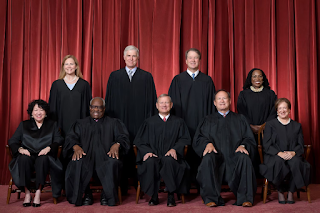July 20 Meeting: Affirmative Action, Reparations, and Racial Discrimination
At our June 29 meeting on the Declaration of Independence, we touched only lightly on the exceptions to “all men are created equal” as exemplified in the 18th century by slavery the slave trade. That same afternoon, we were greeted with the Supreme Court’s affirmative action decision, which brought some of the big race-related issues of our own time into focus.
Many supporters of reparations and affirmative action draw a
direct line between 18th century slavery and the economic and
educational challenges facing black Americans today. In her dissenting opinion
in the affirmative action case, Justice Ketanji Brown Jackson put it this way: “Gulf-sized
race-based gaps exist with respect to the health, wealth and well-being of
American citizens. They were created in the distant past, but have indisputably
been passed down to the present day through the generations.”
In the light of this renewed debate, we would like to focus
our July 20 meeting on the question of whether reparations and affirmative action in college
admissions are appropriate responses to the challenges of
racial inequality in America. Here are a few background readings, just a
sampling of the flood of recent writing on the subject. Feel free to add your own
suggestions for readings on any side of these issues in the comments box.
- Why We Need Reparations for Black Americans
- An obstacle to Black reparations in California: Convincing Latinos and Asians
- Affirmative Action Was Banned at Two Top Universities. They Say They Need It
- I Teach at an Elite College. Here’s a Look Inside the Racial Gaming of Admissions
- Harvard Undermined Itself on Affirmative Action



The July 5 op-ed by Charles M. Blow, “The Supreme Court Didn’t Put Racism on a Leash …” is on topic and worth reading.
ReplyDeleteYou can find it by googling Charles M. Blow.
Mike Sinclair
When you use the term racial inequality in American can you please be more specific? It's too broad of a statement for a conversation. Be willing to be specific to a particular area, i.e. housing and time period comparison, i.e. today vs 1960 will be helpful. Also, with respect to Affirmative Action as it relates to college admission, nothing in the ruling restricts eligible students to attending college. It does restrict them from attending schools that normal admissions would indicate they may not be up to the work, i.e. UofM, Harvard, UCLA.
ReplyDeleteLastly, a well rounded discussion on race should include what is happening to the Black family in America? When nearly 73% of black children born today will be born out of wedlock, the statistics tell us that the child starts at a significant disadvantage. In 1965 that number was 24%.